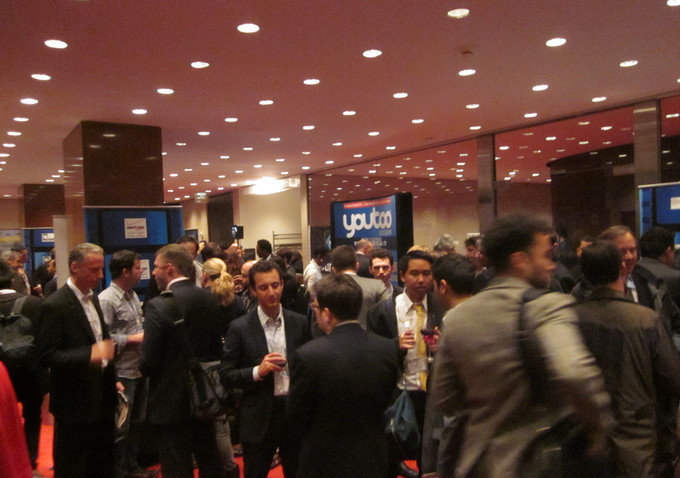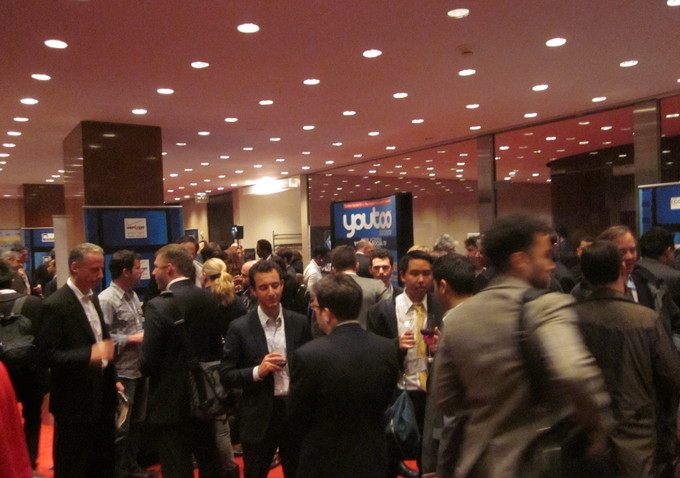By Jacques Thelemaque
Jacques Thelemaque returns today to complete the download of his lessons learned from Digi Hwood knowledge fest. What's the future? Does anyone know? This much I DO know: I would love to have one person cover for our HopeForFilm community all the film related seminars over the course of the year, be they in NYC or LA, and compare what can be gained from these conferences and how they vary. I wonder if we can find a sponsor… I wonder more if we could find one person who can endure — even with the enticement of tasty sandwiches!
The second day of Digital Hollywood started earlier, but I was there on time, excited by the film-specific panels and those bagels, croissants, muffins and pastries with my name on them.
The first panel I went to was "Film Festivals In The Digital Age" presented by IndieWire, moderated by IndieWire staff writer & chief film critic Eric Kohn and including Sebastien Perioche – CEO/President/Founder of Eurocinema On Demand, Amy Dotson – Deputy Director of IFP, Geoff Gilmore – Chief Creative Officer Tribeca Film Festival and Terence Gray – Founder and Executive Director of the New York Television Festival (NYTVF)
Luckily, the panel didn't speak solely about festival issues, but broadened the discussion to address a number of issues swirling around independent film. The panelists all agreed that festivals are more important than ever as curators. But in these challenging times, they also need to be a bit more of a partner for films and filmmakers. After the panel, I asked Amy Dotson how active in the distribution process festivals are willing to be (given that festivals are commonly the only meaningful theatrical distribution a film will get and that the larger festivals often demand a "premiere" to screen your feature). She said that's the million-dollar – but still unanswered – question since it generates so many internal arguments at festivals. In essence, the answer defines the role of the festival – and there does not seem to be a unified perspective on what that role should or could be. Certainly, festivals are still not talking too much about how they can help monetize a filmmakers' work. Sebastien tried to put forth the idea that Eurocinema On Demand can provide exposure and royalties (for European filmmakers only). But many of us filmmakers have heard that promise before. Geoff Gilmore, however, seems to be taking the filmmakers financial interests very seriously. He rightly argued that advertising driven platforms suck. Transactional models work better, but thinks the split with filmmakers is typically underwhelming. He claims Tribeca is trying to create a model that provides guarantees as well as meaningful ancillary cash. Sebastien asked what he means by real cash. But that was never answered. Gilmore feels it is the festival's responsibility to embrace and provide a central platform for new media story-telling (gaming, transmedia, etc.). Amy Dotson said commercial agents for filmmakers is a good idea, if you can find one – not just to make commercials but to generate commercial endorsements for films or new media. Over-all, the panel suggested festivals can best support filmmakers if they have clear goals – whether it be to generate exposure or cold, hard cash.
The next panel – in the very same room (I took a break to pee and lost my really great seat) – was "The Future of Content Distribution". This was the panel I was definitely MOST excited about. On the panel were Daniel Laikind – Founder of Stickfigure Productions (Moderator), Rick Allen – CEO of SnagFilms, Gary Delfiner – SVP Digital Distribution at Screen Media Ventures, Erick Opeka – VP VOD and Digital at New Video, Debra Fisher from Oscilloscope Laboratories, Matt Dentler – Head of Content at Cinetic Rights Management and FilmBuff.
When I got back from the bathroom, the panel was already deep in discussion and were busily listing a few of the interesting new video content sites out there: – Machinima, Vuguru. FilmBuff. SnagFilms. Also, some discussion of YouTube, Netflix and Hulu. That led to a discussion about deal models for filmmakers and the importance of separating rights so that you don't give them all up to a single entity. Non-exclusivity is apparently now more accepted – especially with these new companies/sites – allowing filmmakers to negotiate their rights separately with various companies whose core competency allows them to adequately manage the rights they acquire. They went on to say that Netflix, Hulu, and YouTube are making deals with individual producers. But not up-n-comers. They tend to be fairly established filmmakers or name talent. Deals don't bring as much money as broadcast, but, again, you can negotiate to limit the rights they hold. Matt Dentler said content creators (filmmakers, naturally) need to be a lot smarter. And they have to work with companies that have a true digital strategy. Debra Fisher says we must educate ourselves (filmmakers, naturally) on the various platforms and the "metrics" of each. Afterward, I asked Matt if he can provide a case-study that illustrates how a digital strategy is created. He simply said that digital strategy is broken down into two primary approaches based on whether a filmmaker is trying to make money or trying to build exposure (didn't we hear this at the film festival panel?). They can both feed back into each other, but it is incumbent upon the filmmaker to make that decision. He also said his company (FilmBuff) likes to get involved at the rough cut stage – and not any earlier – to begin devising a strategy. Sadly, never got to hear what a typical strategy might sound/look like.
Then I had lunch. Contemplated going somewhere else to eat. But between being a cheap-ass filmmaker and not wanting to leave the event (it was kinda cold last Friday), I dove back into the potpourri of mini-sandwiches, but was sad to find no tuna sandwiches left. Damn, this conference-going can be so challenging at times.
Next up was the HBO panel – which I knew would be one giant commercial for HBO. I didn't mind. I LOVE HBO and I'm not ashamed to admit it!! It started with a tour of HBO Go. When it was finished, and despite my love for HBO, I had to ask myself "What am I doing here?" But I realized that how HBO crafts it's web presence, apps, interactive experiences and over-all social experience around their shows is a sometimes very applicable model for indie filmmakers. Of course, the social experience for HBO shows cannot be replicated exactly by indie filmmakers because they build them around shows that have already reached a certain level of cultural identity. But here are just a few things to consider:
•Keep on point. Do not create social tools/apps whose relevance to your film/show is a big reach.
•"Seed" your social activity with friends/family/crew/etc. – those with only no degrees of separation from you or the project.
•Every social tool used on the web should have a smartphone/tablet app analogy. And every app should be able to talk to the website.
•Tweeting is a bad experience for direct conversations with audience.
•Don't forget the lurkers – people watching the social interactivity, but not participating.
•HBO connect is a new tool that allows audience to connect with what other HBO fans are buzzing about and even connect with stars. "The water cooler re-imagined" is the tagline for HBO connect. Very clever. And this connectivity with filmmakers and important members of the cast of any film (even the smallest) can be truly meaningful.
I finished the day torn between a "Branded Entertainment" (web ads and short ad-sponsored films) panel vs. an "Oscar Campaign" panel. I think I made the wrong choice. "What did I care about Oscar campaigning?", I thought. And I figured the branded entertainment panel would be good information for filmmakers looking to make some cash for their filmmaking. But, of course, the branded entertainment panel was another mind-numbing onslaught of corporate-speak with no clear treasure map for filmmakers and other content creators to follow. So, I left and came in on the tail end of the oscar panel and they seemed to be saying some very interesting things about marketing in general. And the featured film was a doc – which are always indie and more analogous to indie narrative filmmakers than other forms of "content". But I, sadly, got there too late to fully grasp the whole arc of the discussion.
So, here's just a few takeaways from the second day, and from the conference over-all.
•DVD is dead. Or at least that's what everybody was saying. Don't know if I buy that quite yet for nobody filmmakers.
•A new site called YouToo.com was ubiquitous It offers it's users a "fame spot". It made me depressed.
•Know what your goals are as a filmmaker and work backward from than in your digital strategy. Heck, work backward from that in figuring out what you even want to make.
•Stick to your core competency. Stop pretending you'r a filmmaker, a fundraising genius, tech wizard, a marketing guru and a business wunderkind. Surround yourself with people who are much better at things than you are.
•Nobody has a model for consistent, repeatable money-making in the Digital Universe, yet. But all agree, that's where the money will be. I do, too.
•Engagement is all the rage. But some form of engagement is indeed key, even for us shoe-string indies. It's incumbent upon us to create reasons for people to care about our work.
•In the end, it's clear that content is indeed king. Even though few seemed able to talk specifically about content, it's obvious that every success had a really good story behind it or in it. It's just that there is no easy, repeatable formula for "good". But that shouldn't stop us from trying. And good work will find its way into any platform.
•Fresh baked goods are always pleasant to have around.
At the end, no party. No dinner. Just over. Exchanged a few business cards with some interesting peeps and I was gone. Was I glad I went? Absolutely. Was I totally satisfied. Not completely. I got some great info, but I was a bit frustrated by the dearth of clarity and specifics – and the lack of substantive discussion of content. I guess my recommend for the future is that they use moderators who truly reflect the audience (instead of industry peers) who will dig in there and get the kind of specifics we need. But there's no doubt we're all – including the panelists – still on a big learning curve. Which means the future is wide open and full of possibilities….




